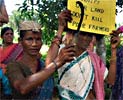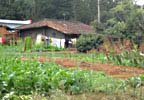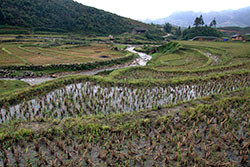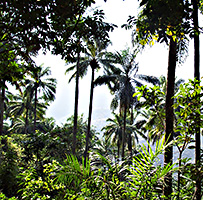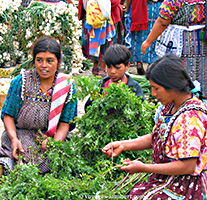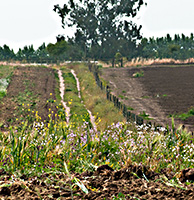A small village in Vietnam – 1955 (1)
Class analysis
“Please, listen to me, my dear sister Quê, it is time to put an end to it. Tôn may be your husband, but don't speak a word to him any more!” Stunned, Quê looks at her brother Chinh. There are tears in her eyes. “Tôn is everything I have. What do you have against him? He is your brother-in-law. I'm married to him.” “Quê, Tôn is the class enemy. He is a land owner, an exploiter. From now on the proletariat is in power, together with landless peasants. We will crush the exploiters.”
It is 1955. The French are the losers. The communists have won. A few years ago Chinh had signed up for the resistance. At the liberation many soldiers returned to the villages, but not Chinh. He only came back half a year later. He was appointed section head, and he started to carry out the land reform, on which the revolutionary government had decided.
Quê is sobbing all huddled up. “I don't understand this. You know the village. You know who is good, and who not. We all know it. Tôn and his family have some rice fields. So what! They have always helped others, they have always worked hard in the field. During the harvest season they have day labourers. What's wrong with that? They are paid well, and get good meals. And, and ...” Quê stumbles over her words. She is a pretty young woman, about twenty years old. Actually she has a delicate face. But now it looks more like a wrung-out dish cloth.
“Quê, stop that sobbing,” Chinh reacts, exasperated. “It is about a class analysis. I became section head, because our family never had a scrap of land. Father was an herbal doctor, but for the rest, we have always lived by working on the fields of others. When someone informs the Party that my sister is married to a land owner, I am finished. For half a year I attended a staff course, I classified all families of our village by their class position, and ...”
Quê doesn't listen any more. She has always loved her brother Chinh. During the war she had prayed so often to the ancestors to protect him. But now she doesn't understand him any more.
_______________________
Source
The novel Paradise of the Blind (1988) written by the Vietnamese author Duong Thu Huong tells about a poor girl, growing up in Hanoi. From her mother she hears stories about the small village where she came from.
Go to:
= part 2: Mayor Duong - a small village in Vietnam – 1989 (2), story 141.
= the next page: 'Half is half' - Sardinia, Italy – 1956 (3), story 117.
= the Table of contents, story 116.
